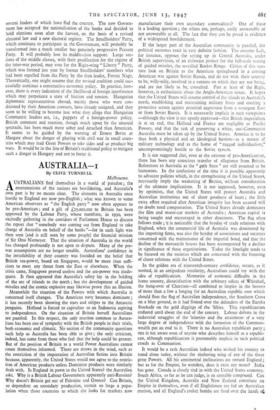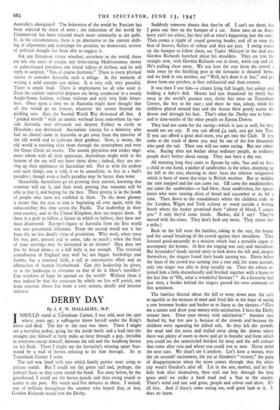AUSTRALIA-a
By CLIVE TURNBULL Melbourne.
AUSTRALIANS find .themselves in a world of paradox ; the reorientations of the nations are bewildering, and Australia's own part is by no means clear. The elements in Australia once hostile to England are now pro-English ; what was known to some American observers as " the English party " now often appears to be pro-American ; and a gift of £25,000,000 to Britain has been approved by the Labour Party, whose members, in 193o, were excitedly gathering in the corridors of Parliament House to discuss the report that " somebody was coming out from England to take charge of Australia on behalf of the banks "—for in such light was then seen (and is still seen by some people) the financial mission of Sir Otto Niemeyer. That the situation of Australia in the world has changed profoundly is not open to dispute. Many of the pre- war assumptions are no longer tenable. Australians' confidence in the inviolability of their country was founded on the belief that British sea-power, based on Singapore, would be more than suffi- cient to meet any threat from the East or elsewhere. When the crisis came, Singapore proved useless and the sea-power was inade- quate. It then appeared that Australia's safety lay in the holding of the arc of islands to the north ; but the development of guided missiles and the atomic explosive may likewise prove this an illusion.
Meanwhile the situation of the Powers with which Australia is concerned itself changes. The American navy becomes dominant ; it has recently been showing the stars and stripes to the Antarctic penguins. Holland is forced to capitulate to an Indonesia aspiring to independence. On the situation of Britain herself Australians are puzzled. In this respect, the only reaction common to Austra- lians has been one of sympathy with the British people in their trials, both economic and climatic. No section of the community questions such help as Australia has been able to give ; the only criticism, indeed, has come from those who feel that the help could be greater. But of the position of Britain as a world Power Australians cannot count themselves informed. There are straws in the wind, such as the restriction of the importation of Australian fiction into Britain because, apparently, the United States would not agree to the restric- tion of American products unless Dominion products were similarly dealt with. Is England in pawn to the United States? the Australian asks. Why is a British Labour Government apparently anti-Russian? Why doesn't Britain get out of Palestine and Greece? Can Britain, so dependent on secondary production, sustain so large a popu- lation when those countries to which she looks for markets now manufacture their own secondary commodities? One of these is a leading question ; the others are, perhaps, easily answerable or not answerable at all. The fact that they can be posed is evidence of a widespread bewilderment.
If the larger part of the Australian community is puzzled, the political extremes react in very definite fashion. The extreme Lcft, for instance, opposes the setting up in Central Australia, under British supervision, of an elaborate project for the Lull-scale testing of guided missiles, the so-called Rocket Range. Critics of this ven- ture look on Britain as the American springboard in a coming American war against Soviet Russia, and do not wish their country to be, willy-nilly, involved in a venture on which they are not being, and are not likely to be, consulted. Part at least of the Right, however, is enthusiastic about the Anglo-American nexus. It hopes that the United States will assume control of the islands to Australia's north, establishing and maintaining military bases and erecting a protective screen against potential aggression from a resurgent East or from Soviet Russia. It is necessarily implicit in such viewpoints —although the view is not openly expressed—that British imperialism is at an end, that Holland and France are negligible as Pacific Powers, and that the task of preserving a white, anti-Communist Australia must be taken up by the United States. America is to be thus both a physical and an ideological bastion—as a master of military technology and as the home of " rugged individualism," uncompromisingly hostile to the Soviet system.
It is not suggested that, even at the extreme of pro-Americanism, there has been any conscious transfer of allegiance from Britain. References to Australia as the " 49th State" are still assumed to be humorous. In the confusions of the time it is possible apparently to advocate policies which, in the strengthening of the United States, necessarily imply the weakening of Britain, without consideration of the ultimate implications. It is not supposed, however, even by optimists,. that the United States will protect Australia and Australian institutions out of sheer goodness of heart ; the little extra effort required after American integrity has been secured will no doubt need compensation. The United States already dominates the film and motor-car markets of Australia ; American capital is being sought and encouraged in other directions. The flag often follows trade ; it is noticeable that the heyday of trade relations with England, when the commercial life of Australia was dominated by the importing firms, was also the heyday of associations and societies concerned with the maintenance of the imperial bond, and that the decline of the mercantile houses has been accompanied by a decline in significance of these organisations. Today the limelight tends to be focused on the societies which are concerned with the fostering of closer relations with the United States.
In the golden era of nineteenth-century confidence, secure, as it seemed, in an antipodean insularity, Australians could toy with the idea of republicanism. Memories of economic difficulty in the home country, dissatisfaction with the arbitrary edicts of Whitehall, the hang-over of Chartism—all combined to inspire in the breasts of more than a few a longing for an Australian republic over which should float the flag of Australian independence, the Southern Cross on a blue ground, as it had floated over the defenders of the Eureka Stockade on the gold diggings of the 'fifties. This republicanism endured until about the end of the century. Labour defeats in the industrial struggles of the 'nineties and the attainment of a very large degree of independence with the formation of the Common- wealth put an end to it. There is no Australian republican party ; one is not aware even of anyone who describes himself as a republi- can, although republicanism is presumably implicit in such political creeds as Communism.
It would be a rash Australian indeed who wished his country to stand alone today, without the sheltering wing of any of the three great Powers. All his sentimental inclinations are toward England ; but as for the Empire, he wonders, does it exist any more? India has gone. Canada is closely tied in with the United States economy. South Africa, so far as he can judge, is an unstable compound. Can the United Kingdom, Australia and New Zealand constitute an Empire in themselves, even if all Englishmen are fed on Australian mutton, and all England's rocket bombs are fired over the heads
Australia's aborigines? The federation of the world by Fascism has been rejected by force of arms ; the federation of the world by Communism has been rejected much more summarily at the polls. If, in the circumstances, there is an alternative to the current shift- ing of alignments and jockeyings for position, no democratic section of political thought has been able to suggest it.
Ask any European visitor whether, anywhere in the world, there are left any oases of escape, any lotus-eating Mediterranean shores or palm-fringed paradises, any island valleys of Avilion, and he will reply in surprise, " Yes, of course Australia." There is every physical reason to consider Australia such a refuge. At the moment of writing a mild autumn sun shines. It is very still, very peaceful. There is ample food. There is employment for all who want it. Even the current industrial disputes are being conducted in a seemly Anglo-Saxon fashion, without violence and with very little bitter- ness. Once upon a time we in Australia might have thought that all this would go on forever, whatever the storms beyond the girdling seas. Alas, the Second World War destroyed all that. A " guided missile " with an atomic warhead from somewhere far out- side Australia very obviously can destroy Sydney as easily as Hiroshim t was destroyed. Australians (except for a minority who had no choice) came to Australia to get away from the miseries of the old world and to cultivate their gardens. Now, it seems, the old world is reaching after them through the stratosphere and over the Great Circle air routes. The atomic physicists and rocket engi- neers whom with all their apparatus, Australians might wish at the bottom of the sea will not leave them alone ; indeed, they are set- ting up their appliances on Australian soil. Not to wish for rockets and such things, one is told, is to be unrealistic, to live in a fool's paradise ; though even a fool's paradise may be better than none.
Meanwhile, Australians go on growing their mutton, knowing that someone will eat it, and their wool, praying that someone will be able to buy it, and hoping for the best. Their destiny is in the hands of people who have not confided in them. To th;!. more gloomy it seems that the race to arm is beginning all over again, with the sabre-rattling this time across the Pacific. The leadership in their own country, and in the United Kingdom, does not inspire them. If there is a path to follow, a future in which to believe, they have not been discovered. Europe's legacy to Australia from the first world war was pneumonic influenza. From the second world war it has been the no less deadly virus of pessimism. Why work, when taxes for war, past, present and to come, take so much ; when the fruit of your strivings may be destroyed in an instant? Man does not live by bread alone ; or a full belly is not enough. The essential contribution of England may well be; not bigger battleships and bombs, but a renewed faith, a call to constructive effort and an affirmation of human brotherhood. Can this leadership be given, or is the landscape as awesome as that of de la Mare's traveller? Can windows of hope be opened on the world? Without them it may indeed be that the structure by which we live will perish, not from external blows but from a very certain, deadly and interior sickness.



































 Previous page
Previous page